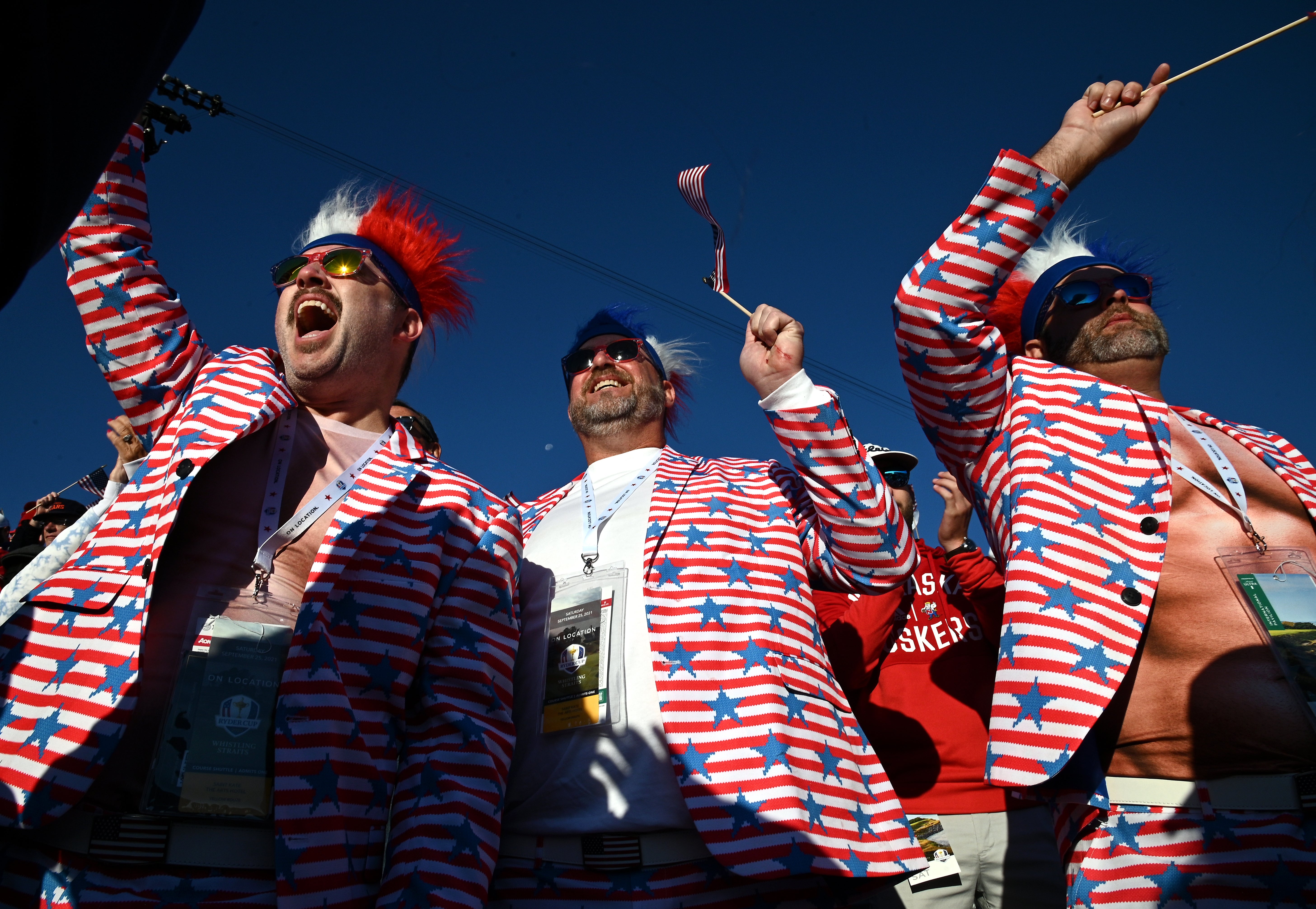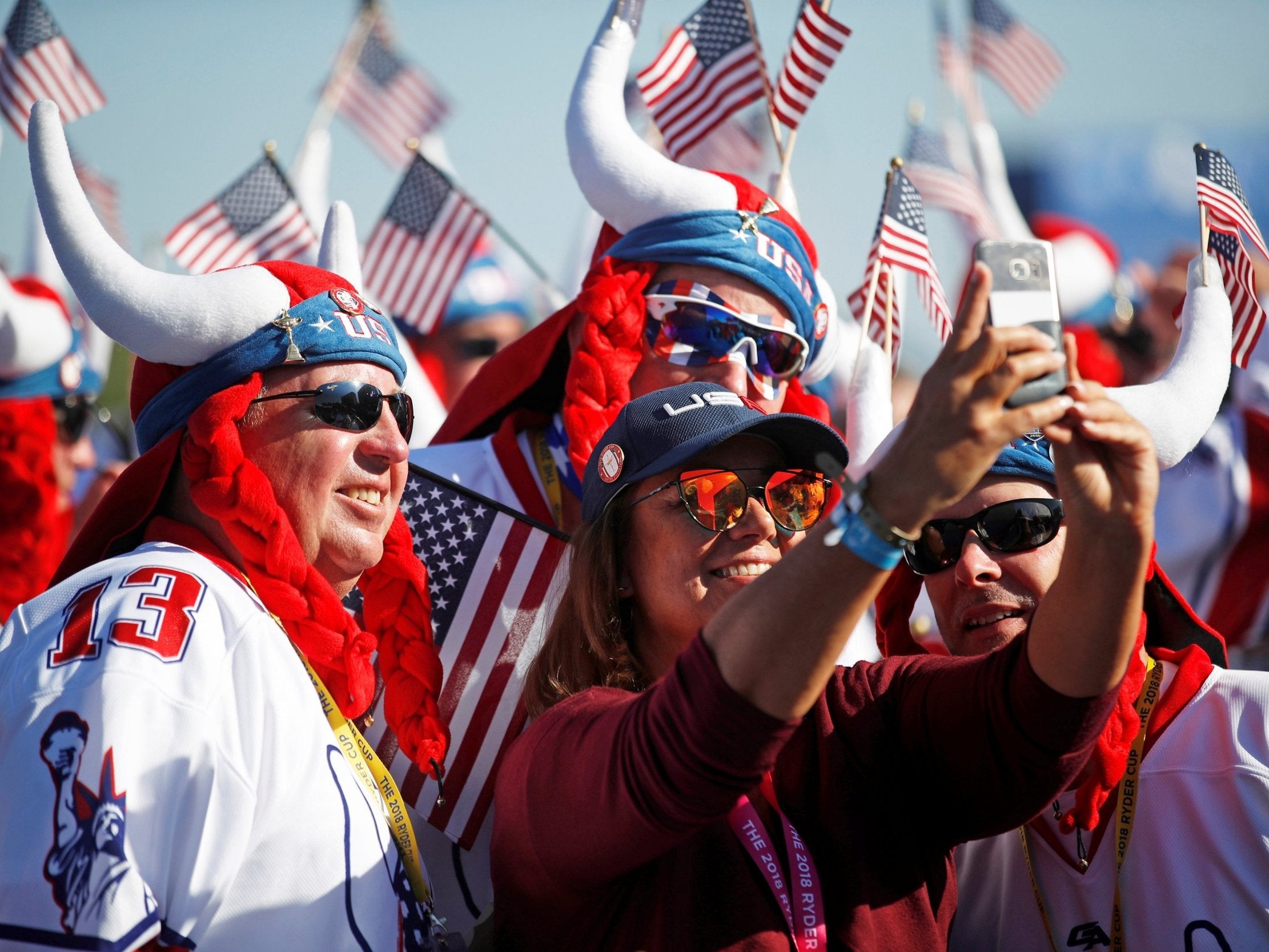Are American Ryder Cup golf fans the most cretinous in world sport?
Nasty, brutish and witless, there will be barrel loads of beery bro culture on display at the Marco Simone course near Rome when the 44th contest begins on Friday. Why are Team USA fans so jingoistic and unsavoury? Jim White has a theory....


The Ryder Cup’s organisers claim theirs is “an event like no other”. And it certainly has fans like no other sporting occasion. At the last staging of the biennial transatlantic golf fest back in 2021, it was hard to miss them. Or who they supported.
A group of a dozen blokes in shades and baseball caps were kitted out in matching stars and stripes jumpers, with the words “God Bless America” stitched across their chests. And they were noisy. Very noisy.
Stationed at the 16th hole at the American Club in Kohler, Wisconsin, very conveniently positioned for a nearby beer tent, across three days of intense golfing action they maintained a relentless barrage of roaring brouhaha. For hours it went on, increasingly boorish as the beers were sunk. Every European player as he arrived at the hole was greeted with arrogant disdain, every American with an aggressive cry of “USA, USA”. Tellingly this was a chant that apparently required the face to be contorted into an ugly mask of superior fury. It was not a pleasant sight for the neutral.
True, among the many fans who diligently observed the necessary etiquette that underpins golf’s unique proximity between player and spectator, these guys represented a minority. But as bad apples go, they were far from alone. And at the Ryder Cup, they are among a minority that appears to grow ever more significant with each iteration. Nasty, brutish and entirely short of wit, there will be plenty of their ilk dotted around the Marco Simone course near Rome when the 44th staging of the contest gets under way at 6.35am on Friday.
Indeed, over the next few days, watching them in action, it will be hard to disagree with the notion posited by Pete Willett who, before watching his brother Danny play in the 2016 staging of the transatlantic contest at the Hazeltine course in Minnesota, reckoned American Ryder Cup supporters the most unlikeable spectators in world sport. “Cretins,” he called them in a piece he wrote for a US golfing magazine, “squeezed into their cargo shorts and boating shoes ... fat, stupid, greedy, classless bastards ... pausing between mouthfuls of hot dog so they can scream ‘Baba booey’ until their jelly faces turn red”.
Other than that, though, a lovely bunch.
And despite the inevitable furore that followed his piece, in which many a US fan absolutely played up to his critique by loudly booing his brother at every turn, Willett had a point. While they have none of the psychopathic tendencies of Russian hooligans on the rampage in Marseille at the 2016 Euros, or the bone-headed destructiveness of the England football fan on tour, or the masked menace of some Italian soccer ultras, it is hard to argue with the notion that American golf fans are particularly unpleasant, the very embodiment of white, male entitlement. Worse, they labour under the crushing illusion that they are funny. Yet from the land that produced Jerry Seinfeld, Robin Williams and Larry David, their attempts at humorous intervention remain entirely free of wit. “Get in the hole” they will bellow at every shot undertaken by an American in Rome. Or, with all the originality of a Centre Court humourist yelling “C’mon Tim” as a Briton plays at Wimbledon, they’ll shout “mashed potato” when a ball is travelling through the air, or “to infinity and beyond” when someone hits a good tee shot. And most of all, every time an American player sinks a putt, they will boom at the top of their voice their trademark, three-letter chant: “USA, USA”.

This is what marks out the American supporter from his European counterpart: the intensity of the jingoism. Because for the American sporting enthusiast an international event is a rarity. This may be a nation that loves its sport, and sees within it the very definition of national character. But their favoured pursuits are marsupial sports, developed in isolation from the rest of the world. There is no national team representing them in international baseball or gridiron competitions while for a long time, professional basketball and ice hockey players were prevented from representing their country at the Olympics. Yes, US teams compete in the World Cup, but for all David Beckham and Lionel Messi’s attempts to drive the rise of the game in the States, football – at least men’s football – remains a minority pursuit there.
Golf, though, matters in America. This is a sport that has an intriguing resonance in the nation’s psyche. Not least in the manner in which US presidents have long been required to demonstrate affection for and prowess at the game (George Bush Sr was the Potus who had a handicap as low as 11, Dwight D Eisenhower was more than useful on the greens, while it will come as little surprise to learn that Donald Trump was the one who adopted the greatest flexibility to the game’s rulebook). So the Ryder Cup is a chance to watch their boys playing for the reputation of the nation. These are representatives of American values. Like the English watching the Ashes, or the Welsh at the Six Nations, the Irish at the Rugby World Cup or the Scots at the Olympic curling, this is war by another means.
For those following the European team, there is none of that. In truth, the European amalgam is a conceit, dreamed up to make the contest a little more competitive after the Great Britain and Ireland team lost every single match between 1957 and 1981.
Yet the irony in this is that while the US fans are fired by patriotism, by the flag, by a presiding sense of Americanness, their team has too often in the recent past failed to rise to the occasion. Ahead of every contest they may talk a good game, in the week leading up to tee off endlessly speaking of how they hold the hopes of the nation in their hands, but when it comes to the action, egos have frequently intervened. No more so than in 2018, when a hugely talented American team imploded in bitter acrimony, with Brooks Koepka and Dustin Johnson reportedly engaging in a full-on fistfight in the dressing room. Phil Mickelson, apparently the US team’s wisest old head, summed up the dysfunction at a press conference after their comprehensive defeat in which he systematically picked off the deficiencies of his captain Tom Watson. This, after all, is an individual sport and the competitive fury of the regular season had clearly overwhelmed any sense of working together.

The Europeans on the other hand, may have no flag to rally around but have consistently played above themselves. That 2018 win was no outlier. Ever since Seve Ballesteros, perhaps driven by a chippy distaste for the American sense of superiority, first steered Europe to victory in 1985, players like Colin Montgomerie, Sergio Garcia and Ian Poulter, who between them have precisely one major title, have routinely outperformed their more illustrious opponents. As their players fail to cohere, American captains have looked in frustration at the togetherness of their rivals. Here is the competition’s intriguing uniqueness: in a sport normally so individual, at the Ryder Cup the team matters.
Which explains the American captain Zach Johnson’s team selection this time around. With the towering superstars Tiger Woods and Mickelson now gone, he has eschewed the opportunity to select oversized egos like Bryson DeChambeau and Patrick Reed, preferring instead to stick to players who largely grew up together, sharing dorms on the college circuit, mates rather than rivals. They may be Americans, with all that entails, but he wants his team to be more European.
And if it works, the bawlers and braggers in their stars and stripes jumpers will be louder than ever. It may be as well over the next few days, even for those of us watching from a distance on telly, to wear earplugs.






Join our commenting forum
Join thought-provoking conversations, follow other Independent readers and see their replies
Comments